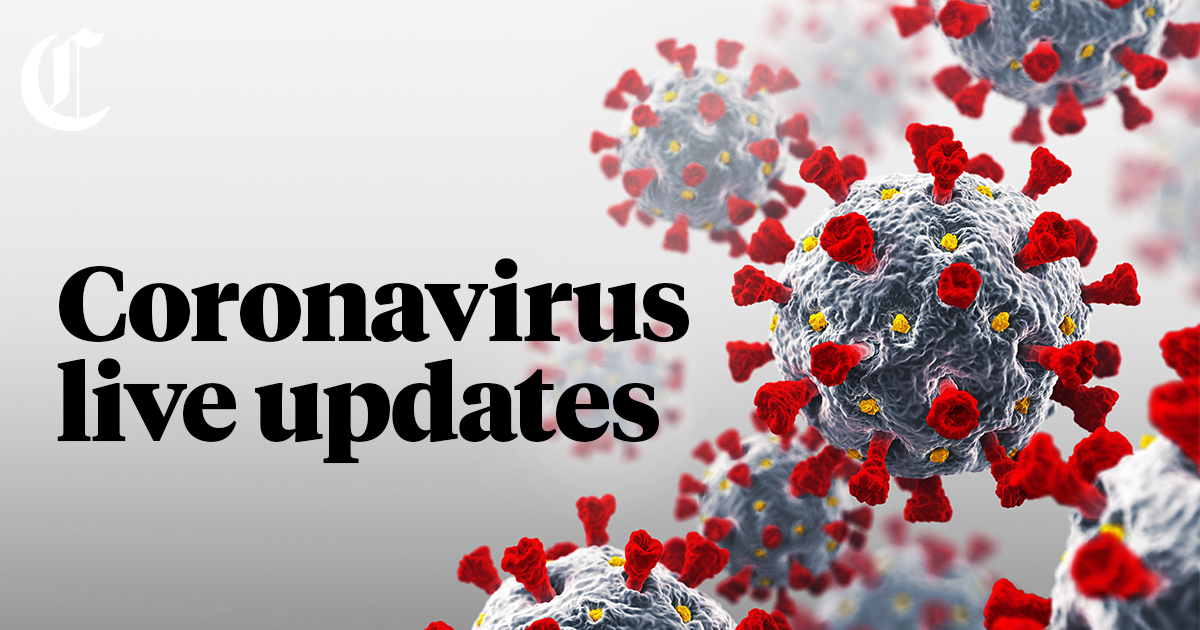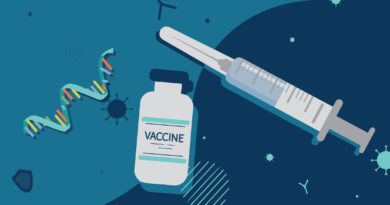COVID live updates: More than 6 million Californians now have been infected since pandemic began

California has shattered a pandemic high for positive coronavirus test results with more than 1 out of 5 tests showing COVID-19 infection. Amid the omicron-driven surge, many health experts say there’s reason to be hopeful that the Bay Area will come out the other side of this wave better protected than before. California’s attorney general says people should be on guard against price gouging for at-home COVID-19 test kits, with Gov. Gavin Newsom signing an executive order limiting seller markups.
Latest updates:
COVID hospitalizations in U.S. reach a record high: There were a record 141,385 people hospitalized with COVID-19 in the United States on Monday, according to data from the Department of Health and Human Services. The surge of hospitalizations driven by the highly contagious omicron variant surpassed the previous peak of 132,051 set during the winter surge last January. Nearly 20% of all hospitalizations in the country are for complications related to COVID-19. Many hospitals nationwide have already suspended non-essential procedures as cases continue to rise unabated.
New isolation guidance for health care workers offers short-term “flexibility,” state says: California’s new guidance that allows infected, asymptomatic health care workers to stay on the job is meant to provide over-burdened hospitals with more options for maintaining critical staffing; it should not be used to require infected people to return to work, said Dr. Mark Ghaly, secretary of California Health and Human Services, on Monday. He noted the guidance, which expires Feb. 1, is a short-term solution to what could be a very challenging few weeks. “We’re providing the latitude, the flexibility, to have certain individuals who are asymptomatic and willing to come back to work to help serve patients,” Ghaly said. “Nobody at the state is requiring health care workers to come back who are infected or quarantining.”
Sonoma County bans large gatherings during omicron surge: Citing a rapid rise in COVID-19 cases, Sonoma County health officials on Monday asked residents to stay home as much as possible for the next 30 days and limit interactions with people outside their immediate household. Health Officer Dr. Sundari Mase also issued a health order prohibiting large gatherings of more than 50 people indoors or more than 100 people outdoors. Sonoma County is the first in the Bay Area to reinstate such a ban in response to the omicron surge. Shelter-in-place orders were used statewide before vaccinations became widely available to curtail spread of disease, in particular during the first wave of disease in March 2020 and during last winter’s surge. Sonoma’s order is in effect Wednesday through Feb. 11. “Our case rates are at their highest level since the pandemic began and our hospitalizations are climbing at an alarming rate as well,” Mase said in a statement. “We are seeing widespread transmission occurring within unvaccinated groups as well as some transmission among vaccinated individuals.”
California averaging 100,000 cases a day: The state has been reporting roughly 100,000 cases each day for the last several days as the omicron surge continues to explode, Dr. Mark Ghaly, secretary of California Health and Human Services, said during a news briefing Monday afternoon. “COVID once again with omicron is gripping our state, challenging our health systems and impacting communities that have already been hard hit,” Ghaly said. When COVID cases are added to the rest of the hospital population, the state is “knocking on the door” of nearly 52,000 people hospitalized, only about a thousand fewer than last winter’s peak.
California surpasses 6 million cases total: California marked a pandemic high for positive coronavirus test results on Monday with more than 1 out of 5 tests showing COVID-19 infection, as hospitals braced for an even greater influx of new patients. The state has surpassed 6 million cumulative coronavirus cases reported since the pandemic began. California’s most recent 7-day average hit a rate of 22% positive results on Jan. 5, according to the most recent state data compiled by The Chronicle. That surpasses California’s previous 7-day high of 17.1% recorded during last year’s winter surge, and is dramatically up from 5.4% just two weeks ago. Read the full story here.
Insurance to cover COVID tests: Starting Saturday, private health insurers will be required to cover up to eight home COVID-19 tests per month for people on their plans. The Biden administration announced the change Monday as it looks to lower costs and make testing for the virus more convenient amid rising frustrations. Under the new policy, first detailed to the Associated Press, Americans will be able to either purchase home testing kits for free under their insurance or submit receipts for reimbursement. With the limits, a family of four could be reimbursed for up to 32 tests per month. PCR tests and rapid tests ordered or administered by a health provider will continue to be fully covered by insurance with no limit.
Wachter questions CDC’s quarantine policy: Dr. Bob Wachter, chair of medicine at UCSF, said the federal CDC’s updated isolation and quarantine guidance is sowing confusion — including for him. CDC guidance says infected people should isolate for 5 days “and if they are asymptomatic or their symptoms are resolving (without fever for 24 hours),” they should wear a mask around others to minimize the risk of infecting them. Posting a picture of a positive antigen rapid test result on his Twitter feed, Wachter, whose son recently tested positive, said, “My son’s now 5d since symptoms. He’s better (now mild sore throat, no fever). Binax is below. I study this for a living & am confused by CDC recs. Work (with mask) would’ve been OK if we didn’t test, but since we did, he should stay home 5 more days? Huh?”
Rapid tests reliable in detecting omicron, UCSF study finds: Using data from COVID-19 testing at a walk-up San Francisco community site that administered simultaneous nasal rapid antigen BinaxNow tests and laboratory PCR tests in 731 patients, UCSF researchers found the at-home tests to be effective in detecting the omicron variant of the virus. Out of the 296 positives detected by PCR testing, researchers found “when stratified by symptom status, the BinaxNOW detected 43 of 59 RT-PCR positive persons who were asymptomatic for a sensitivity of 89.8%; sensitivity was 97.6% for persons with symptoms.” In a Twitter post, UCSF’s Bob Wachter called the results, “Reassuring (albeit confusing given prior concerns).”
Children’s COVID cases swell to close to 600,000 in a week: There were 580,247 child COVID-19 cases reported nationwide for the week ending Jan. 7, with children representing 17.3% of the weekly reported cases in the United States, according to data published Monday by the American Academy of Pediatrics and the Children’s Hospital Association. Among states reporting, children ranged from 1.7%-4.3% of total cumulated hospitalizations, the report says. The latest tally represents a substantial increase from the 325,340 pediatric cases tallied last week — and the peak of 251,781 recorded during the summer delta surge in 2021.
Latest wacky COVID conspiracy touts hypnosis notion: An unfounded theory taking root online suggests millions of people have been “hypnotized” into believing mainstream ideas about COVID-19, including steps to combat it such as testing and vaccination, the Associated Press reports. In widely shared social media posts, efforts to combat the disease have been dismissed as “mass formation psychosis.” The term gained attention after it was floated by Dr. Robert Malone on “The Joe Rogan Experience” Dec. 31 podcast. Psychology experts debunk the concept.
Palo Alto seeking parent volunteers to keep schools open: Palo Alto schools are getting traction on a “call to action,” pleading for parent volunteers to help out while staff members are out due to the COVID-19 crisis. Parents are needed “in designated roles that are coordinated by PTA and school leadership,” Palo Alto Unified officials said on the district website. “We need your help to volunteer as never before,” Superintendent Don Austin said in a video message emailed to parents on Sunday night. The district said it had responses from 360 parents by Monday morning. Jobs include helping with coronavirus testing, lunch and recess duty, light custodial duties, office work and classroom support.
S.F. says processing delays limit hours at 4 test sites: Increased nationwide demand for lab processing of test results is what has led to a temporary reduction in hours at four San Francisco coronavirus test sites, city health officials said Monday. That will reduce overall capacity in the city by about 4%, or about 250 tests per day out of the current 7-day average of 6,000 tests per day at sites affiliated with the S.F. health department — which account for about 60% of tests conducted in the city — they said. After Monday, reduced hours are planned for the Ella Hill Hutch, Alemany and SOMA (7th/Brannan) sites. Southeast Health Center was affected Monday morning only, and resumes normal hours Tuesday.
Health care workers push back against new CA return-to-work guidance: Organizations representing health care workers reacted strongly against California health officials’ new guidance saying these workers can stay on the job if they are infect with COVID-19 but do not have symptoms. Health care unions predicted that foregoing more strict precautions will increase workplace outbreaks and put vulnerable patients at risk. SEIU-United Healthcare Workers West said hospitals should reject the guidance and maintain stricter precautions such requiring a negative test before a COVID-19 positive or exposed healthcare worker returns to work. “Our union will fight for safe working conditions for hospital workers who have continuously put their lives on the line during this pandemic,” said union president Dave Regan.
Pfizer and Moderna say omicron vaccines are on the way: Pharmaceutical companies are racing to develop omicron-specific COVID vaccines boosters. Pfizer CEO Albert Bourla said on Monday that its version could be ready in March. “The hope is that we will achieve something that will have way, way better protection particularly against infections, because the protection against the hospitalizations and the severe disease — it is reasonable right now, with the current vaccines as long as you are having let’s say the third dose,” Bourla said on CNBC. Moderna CEO Stéphane Bancel said its booster is already in trials. “As you know, we’re working very actively on an omicron-specific vaccine as a booster,” Bancel said in a separate CNBC interview Monday. “That should be in the clinic very soon and we are discussing with public health leaders around the world to decide what we think is the best strategy for a potential booster for the fall of 2022.”
California schools risk ‘colossal’ loss of dollars as enrollment drops: School districts across California are worried about losing millions of dollars all at once, resulting in staffing cuts in a time when students need more attention than ever. After two years of not being penalized for declining enrollment during the pandemic, school districts are bracing for a sudden drop in revenue next year as their funding gets recalibrated to match current enrollment, which plummeted since COVID-19 first closed California’s schools. Read the full story here.
Coronavirus-infected hospital staff without symptoms can stay on the job in California: Faced with an exponential rise in COVID-19 cases across California, the state’s Department of Public Health now says that health care workers who test positive for the virus can remain on the job — at least through Feb. 1. The policy shift is prompted by the need to keep hospitals functioning during the current surge, the department said. Read the full story here.
Some S.F. testing sites temporarily cut hours: San Francisco’s health department issued a notice that some coronavirus testing sites affiliated with the city on will temporarily limit their hours of operation Monday “due to challenges beyond our control.” A list of testing sites with updated hours can be found at http://sf.gov/gettested, the agency tweeted Sunday. Officials urged people to check with their own health provider first for testing. “Do not go to the ER for tests,” they said — echoing recent calls to reserve emergency departments for people who are critically ill. For more information about when you should go to the ER with COVID symptoms, go here.
Wachter says his son’s COVID case is improving: UCSF chief of medicine Dr. Bob Wachter, who Saturday on Twitter recounted his son’s coronavirus infection in a detailed and personal 25-tweet thread, reported Sunday that the 28-year-old is improving. “Thanks, folks, for asking about my son,” Wachter tweeted. “Better today, though throat’s still bad. Many going through far worse.” He said that while he’d encountered some “nasty people (and bots)” on Twitter, “I’ve been impressed more by the kindness.”
Milpitas Unified reverses course, will keep classrooms open: Milpitas Unified School District says classes will be in-person this week, reversing plans for a “districtwide quarantine” announced Friday. In a letter to the community on Saturday, the superintendent’s office said that the Santa Clara County Office of Education told the district that only the county Public Health Department could declare a community quarantine. Parents and caregivers concerned about health and safety may choose short term or long term independent study for their children, the district said, adding that those interested should contact their principals.
Rep. Ocasio-Cortez has COVID-19: The office of U.S. Rep. Alexandria Ocasio-Cortez, D-N.Y., said Sunday that she has tested positive for the coronavirus. “She is experiencing symptoms and is recovering at home,” her office said on Twitter. “The Congresswoman received her booster shot this Fall, and encourages everyone to get their booster and follow all CDC guidance.”
Don’t call 911 for non-emergencies, S.F. officials urge: San Francisco officials are warning that, due to high demand and staffing shortages fueled by the omicron surge, people should only call 911 for “life threatening emergencies.” People should not call 911 or go to the emergency room seeking a COVID-19 test or for mild flu-like symptoms, they said. “Please help us keep ambulances available for medical emergencies,” said San Francisco Fire Department Chief Jeanine Nicholson at a virtual news conference Saturday. Nicholson said a surge in 911 calls is “putting a strain on the system,” with the city recently logging more than 400 emergency calls a day, compared to the usual 300 to 330. Read the full story.
*** This article has been archived for your research. The original version from San Francisco Chronicle can be found here ***


